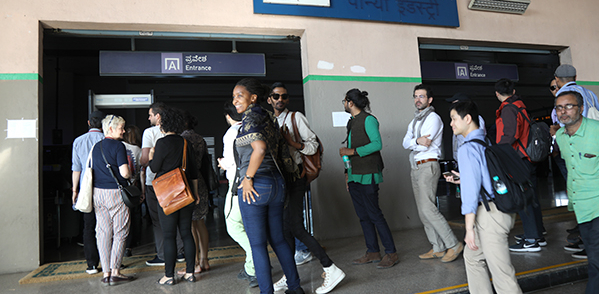
Bangalore Retreat 2019
One of the key objectives of PEAK is to ‘grow’ a global cohort of postdoctoral scholars, collaborating over three years and five countries, equipped to develop new ways of research on the city and new ways of working with cities. In the furtherance of this objective, we held our first annual retreat from 14-18 January 2019 in Bangalore, India.
Holding retreats at different partner locations in rotation offers a unique opportunity to get to know not only a different city and its challenges, but also to explore it through the lens of the research that PEAK Urban partners are undertaking. The Bangalore retreat activities were structured specifically around ‘place’ in order to provoke questions and reflections on what it meant to study ‘place’, and how we read the urban from our different locations. This allowed us as group to read the city from and through Bangalore (in this case), but also to read Bangalore from Medellin, Beijing, and Oxford.
Retreat activities were structured using different modes of engagement: through a set of academic readings on what it meant to think at the city scale and the use of the ‘urban’ as an intellectual category, as well as readings, short films, and popular writing on Bangalore; through exposure visits to different parts of the city and reflections on these visits; and through interactions with practitioners in the city.
The activities that focused on Bangalore were designed with three objectives in mind: first, to give PEAK Urban visitors an orientation to the city through various facets (economic activities, social characteristics and environmental challenges); second, to introduce the larger group to the kinds of research that the IIHS team plan to undertake and potential sites within the city where these might be situated; and third, to enable us to reflect collectively as a group on what it means to study emergent urbanisms through particular locations and from our individual sites.
The Bangalore interaction, including both the readings and the field trips within the city, were curated to give a sense of the transitions the city has experienced and the types of contemporary challenges that urban researchers and practitioners face. We selected sites, readings and other materials that reflected the economic, social, and spatial history of the city, and how these influenced current research and practice in and around Bangalore. Additionally, a classroom-based session led by Dr Ravindra, a former civil servant who had held varying positions in the city and state administration (including Municipal Commissioner), provided reflections on his experience working in Bangalore for over four decades. His talk offered an interesting perspective on the transitions that Bangalore had been through and is currently navigating as well as its challenges through the lens of an administrator and practitioner.
The field trips were curated over two days. They were also designed to help the retreat participants experience the city through different modes of transport, including walking, public transit (using the Bangalore Metro), and buses. Participants received a briefing in advance of each trip explaining the context for the trip, as well as a handout with details on each of the stops that we would be making over the course of the trip. This also allowed the group to engage with the city and its fabric in different ways. The first day focused more on economic and spatial transitions in Bangalore – it began with looking at older, pre-colonial planned neighbourhoods, moving on to post-independence public sector industrial settlements, and ending with a walk through the pre-colonial ‘native’ city core.

The second trip focused more on the environmental history of the city and current challenges. We began with a walk through the city’s botanical gardens that were built by the British on the site of a former pre-colonial settlement, to the emerging developments (including new IT parks and high-rise gated residential communities) on the periphery of Bangalore that are being built on former lake beds, and ended the trip with a visit to one of the largest and most heavily polluted lakes in Bangalore. The biggest environmental challenge that Bangalore faces is around the question of water and these visits highlighted the various aspects of this challenge.
Both field visits introduced the PEAK Urban group to the kind of work that IIHS plans to undertake through the six Bangalore research streams: economic transitions looking at deindustrialising spaces and changing livelihoods, spatial transformations and the implications for land use planning and financing, energy and water challenges, public health, and governance and infrastructure concerns. The reflection sessions that followed each trip focused on unpacking the experience that the group had while engaging with Bangalore. They encouraged the larger PEAK Urban group to reflect on their experience of seeing Bangalore through two lenses: their own individual sites and locations (i.e. Beijing, Medellin, and Oxford) as well as through their respective disciplines.
Having finished our very successful first retreat (full report available here), preparations for the next one have already begun as a collective effort. We’ll see you again in Medellín in February 2020!

